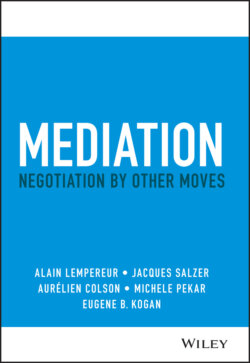Читать книгу Mediation - Alain Lempereur - Страница 61
Good Time Management
ОглавлениеAll of the above underlines how long it takes to overcome, peacefully, a conflictual situation, because a multiplicity of factors need to be taken into account: (re)establishing the relationship, receiving and considering emotions, describing contents, dealing with needs, imagining appropriate solutions, and obtaining commitment. From this point of view, the comparison between mediation and negotiation reminds us of the fable The Tortoise and the Hare by La Fontaine: the hare‐negotiator tries to rush the exchange, to finish it quickly, but without ripeness. The tortoise‐mediator, on the contrary, meticulously progresses, step by step, grasping the deep sense of words pronounced by each person … and guess who crosses the finish line first?
But the image of the tortoise has its limits. Indeed, mediation is not slow: it is much faster than a court ruling, as it presents several advantages. First, long periods of time elapse before a judge addresses a case, except for emergency interim proceedings. Second, once the decision has been made in the first resort, appeal remains possible, again postponing a decision to a potentially distant horizon. From start to finish, it is not rare for a court ruling to require several years. Mediation can be started in a short time, and take from just a few days to a few months in the most complex cases. Therefore, if it succeeds, it saves years to the benefit of all parties.
Besides, if it takes some time for a case to be litigated, the time dedicated by the judge to review it is short, really too short: the parties have the feeling that “their” case is expedited in minutes, stuck between dozens of others. In front of a civil judge, the parties' arguments are so brief that deep explanations are impossible. It is true that mediation will take more time: first to understand (one another), then to listen to one another until a solution is reached. In brief, in litigation, the frustration of the waiting time for a decision adds to that of a shortened hearing. By contrast, mediation intervenes more quickly, and then, as Talleyrand says, knows how “to take one's time.”
Other forms of external decisions (the vote, a hierarchical decision, etc.) are settled quickly – limited time for a debate before a vote or for an explanation to a hierarchical authority. But again, parties often feel they lack the time to explain themselves, as in court. The way mediators manage information exchanges will thus be perceived as a loss or gain of time, depending on the length of time it takes to renew the relationship, to dig into a problem deeply, and to brainstorm solutions.
Thus, mediation manages time well. It consumes a little but utilizes it well.
